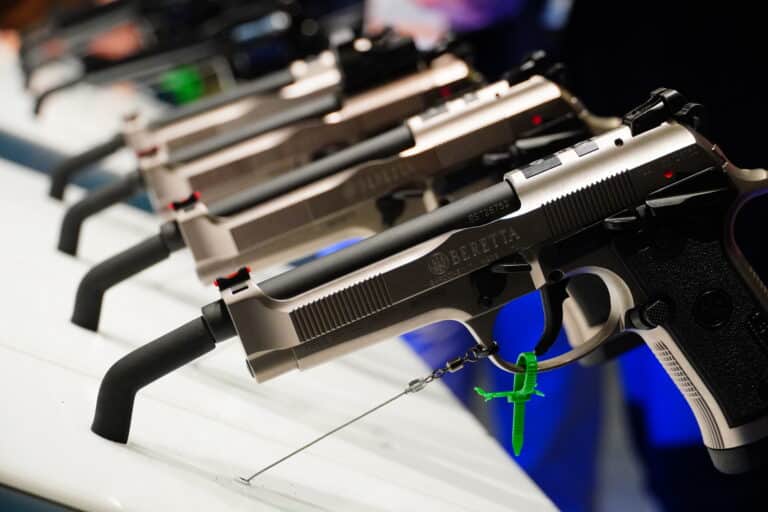The Supreme Court’s most recent Second Amendment decision could boost the government’s ability to disarm certain Americans in the long run. But it appears to have pushed two federal appeals court judges to the opposite conclusion in a new ruling on a non-violent felon’s gun rights.
On Monday, the en banc Third Circuit Court of Appeals returned the first decision to side with a Second Amendment challenger in a case the Supreme Court vacated and remanded after its Rahimi opinion. For the second time, it ruled that the government may not disarm Bryan Range over his 30-year-old felony conviction for lying on a food stamp application.
“We agree with Range that, despite his false statement conviction, he remains among ‘the people’ protected by the Second Amendment,” Judge Thomas Hardiman wrote in Range v. Garland. “And because the Government did not carry its burden of showing that the principles underlying our Nation’s history and tradition of firearm regulation support disarming Range, we will reverse and remand.”
While the unchanged judgment was largely expected based on the tenor of the case’s second oral arguments, one facet of Monday’s outcome stood out. Two judges who dissented the first time the Third Circuit heard the case—Cheryl Ann Krause and Jane Roth—signed onto the majority judgment this time around, expanding the margin of the government’s defeat. Moreover, they cited the Supreme Court’s Rahimi opinion as driving that change of heart.
“I take from Rahimi several lessons that compel a different rationale than the majority’s today and that lead me now to concur in the judgment,” Judge Krause wrote in her concurring opinion, which Judge Roth joined.
That Rahimi would prompt multiple judges to rule against the government’s desire to disarm someone could surprise some observers. After all, Rahimi was an 8-1 Supreme Court ruling in favor of the government’s power to disarm those subject to domestic violence restraining orders. Justice Clarence Thomas, the author of the Bruen test, was also the lone dissenter in Rahimi. In his scathing dissent, he essentially charged the majority’s reasoning with already undermining its nascent Second Amendment test and granting broad latitude to the government’s power to disarm.
“Given that imprisonment (which involved disarmament) existed at the founding, the Government can always satisfy this newly minted comparable-burden requirement,” Thomas wrote. “That means the Government need only find a historical law with a comparable justification to validate modern disarmament regimes. As a result, historical laws fining certain behavior could justify completely disarming a person for the same behavior. That is the exact sort of ‘regulatory blank check’ that Bruen warns against and the American people ratified the Second Amendment to preclude.”
Yet according to Judge Krause, the “regulatory blank check” Thomas forewarned about actually redounded to the benefit of a non-violent felon looking to get his gun rights back.
“Although § 922(g)(1) on its face fits ‘neatly within’ our historical tradition, there is one respect in which the regime it establishes—in practice—does not comport with the ‘how’ of these relevantly similar historic regulations,” she wrote. “As I read Rahimi, that qualification obligates us to consider and ultimately grant Range’s request for declaratory relief.”
Specifically, she noted that the history and tradition of “categorical disarmament laws,” which allowed Founding-era governments to deny arms to certain groups presumed to pose a risk to society, also contained ways for individuals to contest that disarmament.
“There was typically a mechanism for him to petition and attempt to rebut that presumption—whether by taking a loyalty oath, renouncing allegiance, obtaining a license, or securing a court order,” Krause wrote. “Even for offenses historically punishable by death or lifetime imprisonment, and hence, encompassing permanent disarmament, that punishment followed individualized determinations made by a judge and jury, and a convicted felon could also seek clemency or a pardon based on his individual circumstances.”
She argued the presence of those rebuttal mechanisms within the country’s regulatory tradition matched with “Rahimi’s attention to the individualized findings required by and the durational limit” of the particular domestic violence restraining order gun ban the Supreme Court blessed in that case. Taken together, she said those two fact patterns point to a constitutional principle “where disarmament is based on a categorical presumption of special danger to society, there must be a meaningful opportunity for individualized review to survive constitutional scrutiny.”
While she disagreed with the majority’s view that the burden should be on the government to prove that someone like Range is still too dangerous to possess gun rights instead of the other way around, she argued that Range’s decades of law-abiding conduct since his one, non-violent felony-equivalent offense rendered his “individualized review” an easy call.
“Ultimately, however, the majority and I land in the same place because I conclude that Range has carried that burden,” Krause concluded.
To be sure, Rahimi’s influence on Krause’s thinking is not likely to totally reassure gun-rights advocates still wary of the Supreme Court decision’s ramifications. Beyond the specifics of Range’s challenge, Krause made it a point to emphasize how she reads Rahimi as endorsing looser analogizing in Second Amendment cases more generally.
One of its lessons confirming “the premises of [her] prior opinion,” she wrote, is that “we should indeed determine ‘whether the challenged regulation is consistent with the principles that underpin our regulatory tradition’—not whether it ‘precisely match[es] its historical precursors.'”
The emphasis on looser, principles-based analogies for modern gun laws increases the probability of judges upholding restrictions rather than a more exacting approach to historical laws. Nevertheless, the baseline for the two judges under just Bruen was a ruling against non-violent felons having a path to Second Amendment rights. Rahimi’s help in moving them away from that is not insignificant.






